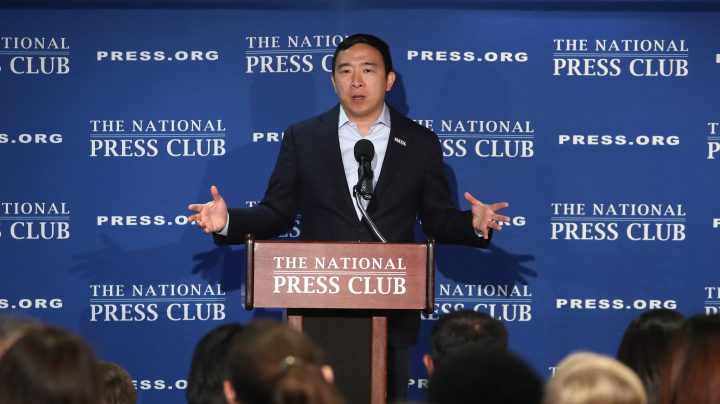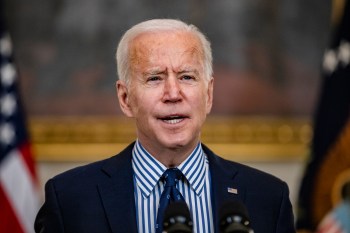
Universal basic income was a fringe idea. Then the COVID-19 pandemic happened.
Share Now on:
Universal basic income was a fringe idea. Then the COVID-19 pandemic happened.

The COVID-19 pandemic is having an unprecedented impact on the U.S. economy. Restaurants and shops have closed. Factories have ceased production. And millions of other businesses are scaling back wherever they can. In the past two weeks almost 10 million Americans have filed for unemployment. The Economic Policy Institute predicts that by summer the country stands to lose as many as 20 million jobs. One of the bleakest projections yet has been put forward by the Federal Reserve bank of St. Louis which predicted that job losses could total 47 million and the unemployment rate would shoot up to 32%.
To soften the blow to the economy, the U.S. government has passed a $2 trillion economic stimulus package to help both businesses and employees affected by the COVID-19 pandemic. Workers collecting unemployment insurance will now be able to collect payments for 39 weeks, up from 26 weeks, and will receive an additional $600 a week for four months. The government also included a one-time payment of $1,200 to Americans earning up to $75,000 and a payment of $2,400 for married couples earning up to $150,000.
A large chunk of the relief payments are expected to go towards the $81 billion worth of rents due this month. Yet rent is due each month and if workers are unable to go back to work in the coming weeks, they might find themselves coming up short again come May. So public figures like New York Congresswoman Alexandria Ocasio Cortess and former presidential candidate Andrew Yang have called on the government to implement a universal basic income and begin making regular payments to the American people.
Support for more regular payments has come from both sides of the aisle as well as from certain industries. Republican Sen. Mitt Romney was among the first lawmakers calling for a one-time payment of $1,000 for all Americans. Independent Congressman Justin Amash has called on the government to provide Americans with direct cash payments for the next three months. And just this weekend Democratic presidential candidate and Vermont Sen. Bernie Sanders called on the government to implement monthly payments of $2,000 to every person in the country, “including the undocumented, the homeless, the unbanked, and young adults.” Other proponents are more specific — David Chang, the chef behind Momofuku Noodle Bar and the host of Netflix docuseries “Ugly Delicious,” told The New York Times that “hospitality workers should get universal basic income of $1,000 a month or minimum 500 bucks or whatever to stay afloat.”
The idea of a more permanent UBI has been growing among the general public, especially among the younger population. In September of last year, a Hill-HarrisX poll found that 49% of Americans would support a permanent UBI program – up from 43% in February 2019. However, support remained low among Republicans, at 30%, and Americans 65 or older, 26%. A more recent poll conducted by the GenForward Survey Project at the University of Chicago found that majority of young voters aged 18 to 36 – 72% of young Democrats, 54% of young Independents, and 47% of young Republicans – strongly support or somewhat support giving everyone $1,000 every month.
“Send them a check … each month.”
If it was up to Andrew Yang, who recently ended his campaign to be the next U.S. president, every American would receive at least $1,000 each month. While still running for president – long before the COVID-19 pandemic – Yang made universal basic income the cornerstone of his campaign. As lawmakers grappled to come up with ways to deal with the current economic crisis, Yang advised hard hit cities like New York to try and implement UBI.
“[W]e’ve got to focus on doing the one thing that we know will help people hit the hardest economically by this crisis: Send them a check of at least $1,000 each month so that they can continue to live,” Yang wrote in an op-ed published by The New York Daily News. “So they can keep their families healthy and safe. So they can make sure their kids’ lives and learning are disrupted as little as possible.”
Matt Zwolinski, director of the Center for Ethics, Economics and Public Policy at the University of San Diego, says that the current stimulus package is not sufficient.
“The stimulus plan on the table calls for $2 trillion in spending. But the only cash transfer included in that plan is a one-time $1,200 payment to individuals,” he points out. “Canada, in contrast, is spending only $75 billion and nevertheless going to pay $2,000 Canadian per month to individuals on a recurring basis. Granted, Canada’s population is significantly smaller, but even adjusting for population, the U.S. is spending more than three times as much per person, while still managing to give less to actual individuals.”
According to Zwolinski, the U.S. should have gone with a proposal put forward by Michigan Congressman Amash to give $1,250 to all American adults and $500 to all children once a month for the next three months. “Giving cash directly to individuals lets them meet their needs with maximum flexibility, and minimizes government intrusion and the temptation to use the stimulus as a masked form of corporate welfare,” Zwolinski said.
Could this be just the beginning?
Yang’s presidential campaign “created more awareness and excitement about a UBI than I could have imagined possible,” Zwolinski said. “In normal times, I suspect that excitement would have faded pretty quickly in the aftermath of his campaign. But the fact that it occurred so close to this pandemic really opened the door for UBI-type solutions in a way that otherwise wouldn’t have been possible. The excitement, the networks, and the ideas were all right there at exactly the moment they became politically relevant.”
The current situation has also undermined many of the usual objections put forth by UBI’s opponents. Typically, the two main reasons people oppose UBI are that it costs too much and that it eliminates people’s incentive to work.
“However, COVID-19 is changing everything,” explained Zwolinski. “All of a sudden, the cost of a UBI isn’t nearly as big a worry as it was even a month ago. Americans across the political spectrum are calling for the government to spend very large sums of money to keep families on their feet, to keep small business afloat, and to keep the economy from collapsing. And there is a growing recognition that cash grants do that in a way that provides maximum flexibility in a time of drastic uncertainty and rapid change. As for work disincentives, this just isn’t an issue right now. The problem we’re facing isn’t lazy people who don’t want to work; it’s that there are too many people who want to work, but can’t. Helping those people is the priority, and cash grants are a relatively cheap and easy way to do it, at least until the economy gets up and running.”
What’s more, direct experience with cash payments like the one-time payment of $1,200 could help Americans better understand the idea behind UBI. When people worry about UBI, they usually worry that other people will misuse the funds. Now Americans will have the opportunity to see how their friends and neighbors are actually using the money and how it can change their lives, said Zwolinski.
Forget UBI, focus on UI
Josh Bivens, director of research at the Economic Policy Institute, is among the skeptics when it comes to UBI.
“Who knows what the future holds, but, I’d be surprised if the current pandemic provided a hugely convincing case for a permanent UBI,” he said. “I think the more-desirable and more-likely outcome would be the pandemic paving the way for an overhaul of our social insurance programs – particularly unemployment insurance. UI should be uniquely poised to have allowed us to weather most of this storm without having to do tons of extra legislation, but our current system is so patchy and stingy that a bunch of emergency ad hoc – but welcome – changes have to be made.”
UBI, according to Bivens, tends to be “poorly targeted.” The whole premise of “universal basic income” is that it’s given universally to everyone. Yet, not everyone is in need of the money.
Unemployment insurance on the other hand is targeted to those most in need: those who find themselves unemployed and without a paycheck.
According to Bivens, U.S. lawmakers could take this opportunity to make the case for beefing up social insurance and safety net programs like unemployment insurance. And, he says, it “would be a bit of a shame” if the focus ended up on universal basic income instead.
There’s a lot happening in the world. Through it all, Marketplace is here for you.
You rely on Marketplace to break down the world’s events and tell you how it affects you in a fact-based, approachable way. We rely on your financial support to keep making that possible.
Your donation today powers the independent journalism that you rely on. For just $5/month, you can help sustain Marketplace so we can keep reporting on the things that matter to you.


















